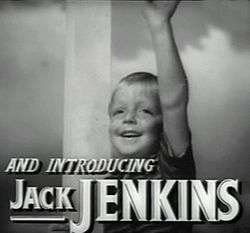Jackie "Butch" Jenkins
| Jackie 'Butch' Jenkins | |
|---|---|
|
from the trailer for the film The Human Comedy (1943). | |
| Born |
Jack Dudley Jenkins August 29, 1937 Los Angeles, U.S |
| Died |
August 14, 2001 (aged 63) Asheville, North Carolina, U.S. |
| Years active | 1943–1948 |
Jackie "Butch" Jenkins (August 29, 1937 – August 14, 2001) was an American child actor who had a brief film career during the 1940s.
Born Jack Dudley Jenkins in Los Angeles, the son of actress Doris Dudley, Jenkins made his film debut at the age of six in The Human Comedy (1943) as Jack Jenkins after an MGM talent scout saw him playing on a Santa Monica beach and admired his high spirits.[1] His performance as Mickey Rooney's younger brother (The Human Comedy) was well received and Jenkins was cast in a succession of films.
He was given star billing for the 1946 film Boys' Ranch. Inspired by the real-life ranch in Texas, which provided a home and education to underprivileged boys, MGM promoted the film as a successor to Boys Town (1936). It co-starred James Craig who also appeared in Jenkins' first film, The Human Comedy, as well as his next film Little Mr. Jim. Jenkins' other films included National Velvet (1944), Our Vines Have Tender Grapes (1945), My Brother Talks to Horses (1947), The Bride Goes Wild (1948) Summer Holiday (1948) and his final film Big City (1948).
Jenkins was one of several popular child actors at MGM during the early 1940s, and was educated at the studio's school along with other youngsters under contract to the studio such as Elizabeth Taylor, Margaret O'Brien, Claude Jarman Jr. and Darryl Hickman. He was regarded as a "scene-stealer" and was notable among the studio's child stars for not being conventionally "cute". He was described by film writers Sol Chaneles and Albert Wolsky as "an audience favourite as an all-American boy [with a] space between his teeth, freckles and a tousled mop of hair – a marked contrast to the pretty children who usually appeared on screen."[1] Pauline Kael wrote approvingly of his effectiveness as a performer, saying that his appearance as a five-year-old who enjoys waving at trains in The Human Comedy helped elevate the film, while his performance in National Velvet made him "the little brother of everyone's dreams".[2] In 1946 exhibitors voted him the second-most promising "star of tomorrow".[3]
Later life & death
He retired from acting at the age of eleven, after he developed a stutter,[4] and as an adult recalled his film career fondly but without regret; he said that he had not particularly enjoyed acting and had never expected to make a career of it. 'Butch' Jenkins established a successful career away from showbusiness and lived for many years in Texas, and died August 14, 2001, at age 63, in Asheville, North Carolina.
Filmography
- The Human Comedy (1943)
- National Velvet (1944)
- Our Vines Have Tender Grapes (1945)
- Boys Ranch (1946)
- My Brother Talks to Horses (1947)
- Little Mister Jim (1947)
- The Bride Goes Wild (1948)
- Summer Holiday (1948)
- Big City (1948)
Notes
- 1 2 Chaneles, Sol and Wolsky, Albert (1974). The Movie Makers. Vineyard Books, New York. p. 279. ISBN 0-7064-0387-8.
- ↑ Kael, Pauline (1982). 5001 Nights at the Movies. Zenith, London. pp. 260 and 407. ISBN 0-09-933550-6.
- ↑ "The Stars of To-morrow.". The Sydney Morning Herald. National Library of Australia. 10 September 1946. p. 11 Supplement: The Sydney Morning Herald Magazine. Retrieved 24 April 2012.
- ↑ Dargis, Manohla. "Jackie 'Butch' Jenkins". New York Times. Retrieved 2007-06-10.
Bibliography
- Holmstrom, John. The Moving Picture Boy: An International Encyclopaedia from 1895 to 1995, Norwich, Michael Russell, 1996, pp. 205-206.
- Best, Marc. Those Endearing Young Charms: Child Performers of the Screen, South Brunswick and New York: Barnes & Co., 1971, pp. 134-138.
External links
| Wikimedia Commons has media related to Jackie "Butch" Jenkins. |
